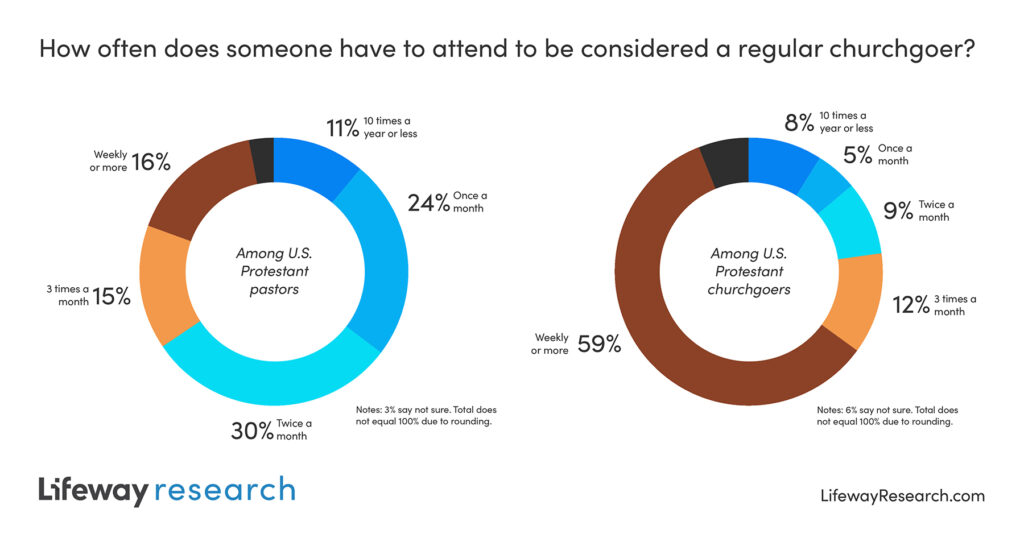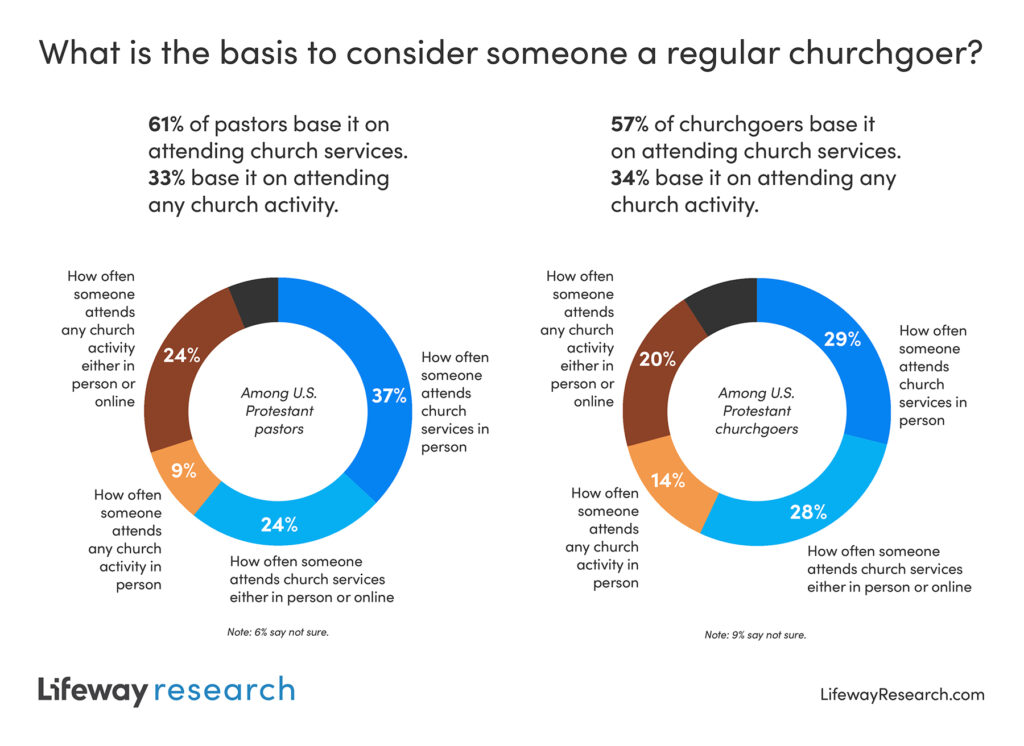
Emerging from a period of paused physical gatherings, pastors and churchgoers are considering what regular church attendance means.
By Aaron Earls
If you want to be considered a regular at a local church by those behind the pulpit and in the pews, you’ll probably need to show up in person at least a couple times a month.
A study from Lifeway Research finds a majority of both U.S. Protestant pastors and churchgoers consider someone to be a regular church attender if they attend twice a month or more. Most also say that’s based on how often they attend a worship service, not other church activities.
“There has likely never been unanimity on what qualifies someone as a regular churchgoer,” said Scott McConnell, executive director of Lifeway Research. “But the question piqued our interest recently as we have heard church leaders speculating that churchgoers are attending less often and that their mindset of who is a regular attender may be changing.”
Church attendance has decreased in the U.S., according to studies from multiple research organizations. Those trends were already pointing downward prior to the COVID-19 pandemic, which only accelerated the churchgoing declines for many. Last fall, Lifeway Research found the average church is currently at 85% of their pre-pandemic attendance levels.
Emerging from a period when most U.S. Protestant churches paused physical worship services for a time, pastors and church attendees are now considering what it means to be a regular churchgoer.
Pastoral perspectives
For U.S. Protestant pastors to consider someone in their congregation a regular churchgoer, 3 in 5 expect attendance at least twice a month, while 1 in 10 include those who attend less than monthly.
Pastors who define regular attendance as less than monthly include those who attend at least once a year (2%), two or three times a year (2%), four or five times a year (2%) or six to 10 times a year (4%). Around a quarter (24%) see those who attend once a month as regular, while a plurality (30%) places the threshold at twice a month.
For U.S. Protestant pastors to consider someone in their congregation a regular churchgoer, 3 in 5 expect attendance at least twice a month. Click To TweetOthers have a higher standard for a regular churchgoer. Around 1 in 7 (15%) say three times a month, and 13% say weekly. For 3% of pastors, only those who attend more than once a week qualify as a regular attender at their church. Another 3% aren’t sure.
“There are practical implications to how often someone attends church,” said McConnell. “Those attending a few times a year are there enough to be known. Whereas those attending weekly likely have deeper relationships and can be counted on to serve. Those at church half the time can only serve if some rotation system is in place.”
The oldest pastors are most likely to have the highest threshold, as 22% of pastors 65 and older say a regular churchgoer attends weekly or more. African American (36%) and Hispanic pastors (25%) are more likely than white pastors (14%) to say at least weekly attendance is the standard for a regular church attender.
Those in the South (20%) are more likely than pastors in the Northeast (12%) or Midwest (11%) to say only those who attend weekly or more are regular churchgoers.

Denominationally, Pentecostal (26%), Restorationist Movement (26%) and Baptist pastors (23%) are more likely than Methodist (11%), Lutheran (4%) and Presbyterian/Reformed pastors (4%) to consider only those who attend weekly or more as a regular attender in their congregation.
On the other end of the spectrum, mainline pastors (30%) are more likely than their evangelical counterparts (20%) to include those who attend once a month among regular churchgoers.
Additionally, pastors at small and normative-sized churches are among the most likely to believe monthly attendance makes someone a regular attender. Around a quarter of those at churches with less than 50 people (27%) and those at congregations of 50 to 99 (27%) say someone who attends once a month is a regular churchgoer.
When thinking about what exactly someone must attend to be considered an attender, most pastors look to church services rather than other activities. Six in 10 U.S. Protestant pastors (61%) say they base their idea of a regular churchgoer on how often someone attends a church service. Less than 2 in 5 pastors (37%) consider strictly in-person attendance, while around 1 in 4 (24%) also factor in online attendance. A third (33%) look at how often they attend any church activity, with 9% pointing to in-person attendance and 24% basing it on physical or online involvement. Few (6%) say they aren’t sure.
Younger pastors, those 18-44, are among the most likely to base their churchgoer definition on attending church services in person (42%) and among the least likely to include online worship service attendance (17%). Evangelical pastors (45%) are also more likely than mainline pastors (25%) to point to physically attending church services.
View from the pews
Churchgoers themselves are likely to place the standard of regular church attendance near their own frequency. In a study of those who attend church at least once a month, 86% say a regular churchgoer is someone who attends once a month or more. Specifically, 60% of respondents attend weekly or more, and 68% of those who attend weekly or more consider someone to be a regular churchgoer if they attend with the same regularity.
The more frequently a churchgoer attends services the more likely they are to place a higher threshold for being considered a regular church attender. Yet, even among those who attend less than weekly, a large portion identify weekly or more as the standard for a regular attendee. More than 2 in 5 of those who attend one time a month (47%), two times a month (41%) or three times a month (48%) point to the weekly or more standard.
“The study of churchgoers only provides insights from those attending each month, but there seems to be a consensus among that group that a regular churchgoer should be involved in the life of a congregation more often than not,” said McConnell. “Pastors’ perceptions of a regular churchgoer often appear broader, while those in the pew lean closer to a weekly standard.”

Hispanic (21%) and African American churchgoers (20%) are around twice as likely as white churchgoers (11%) to say being a regular churchgoer requires attending more than once a week. Churchgoers with evangelical beliefs (55%) are more likely than those without evangelical beliefs (38%) to say the standard is weekly attendance.
Similarly to pastors, churchgoers are more likely to connect being a regular church attender with attending church services rather than other activities. Most (57%) use the church service as their basis, including 29% who focus exclusively on in-person attendance and 28% who include attending services online. Around a third (34%) focus on any type of church activity, with 14% pointing to only in-person attendance and 20% including online attendance. Around 1 in 10 (9%) aren’t sure.
Churchgoers with evangelical beliefs (33%) are more likely than those without (26%) to base regular churchgoing on how often someone attends church services in person.
For more information view the pastor report and churchgoer report.
Lifeway Research studies can be used and referenced in news articles freely. This news release can also be republished in its entirety on other websites and in other publications without obtaining permission.

Methodology
The phone survey of 1,000 Protestant pastors was conducted Sept. 6-30, 2022. The calling list was a stratified random sample, drawn from a list of all Protestant churches. Quotas were used for church size. Each interview was completed by the senior or sole pastor or a minister at the church. Responses were weighted by region and church size to reflect the population more accurately. The completed sample is 1,000 surveys. The sample provides 95% confidence that the sampling error does not exceed plus or minus 3.2%. This margin of error accounts for the effect of weighting. Margins of error are higher in sub-groups.
The online survey of 1,002 American Protestant churchgoers was conducted Sept. 19-29, 2022, using a national pre-recruited panel. Respondents were screened to include those who identified as Protestant/non-denominational and attend religious services at least once a month. Quotas and slight weights were used to balance gender, age, region, ethnicity, education, and religion to reflect the population more accurately. The completed sample is 1,002 surveys. The sample provides 95% confidence that the sampling error from the panel does not exceed plus or minus 3.3%. This margin of error accounts for the effect of weighting. Margins of error are higher in sub-groups.
“Evangelical beliefs” are defined using the National Association of Evangelicals and Lifeway Research evangelical beliefs research definition based on respondent beliefs. Respondents are asked their level of agreement with four separate statements using a four-point, forced-choice scale (strongly agree, somewhat agree, somewhat disagree, strongly disagree). Those who strongly agree with all four statements are categorized as having Evangelical Beliefs
- The Bible is the highest authority for what I believe.
- It is very important for me personally to encourage non-Christians to trust Jesus Christ as their Savior.
- Jesus Christ’s death on the cross is the only sacrifice that could remove the penalty of my sin.
- Only those who trust in Jesus Christ alone as their Savior receive God’s free gift of eternal salvation.







